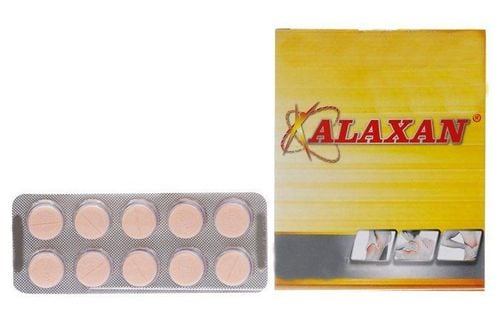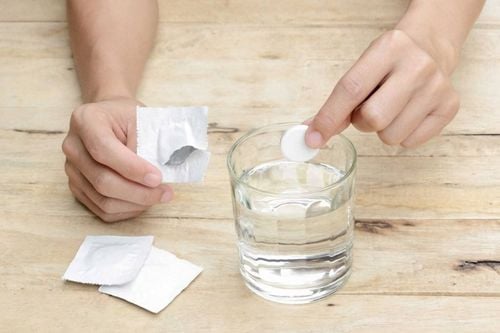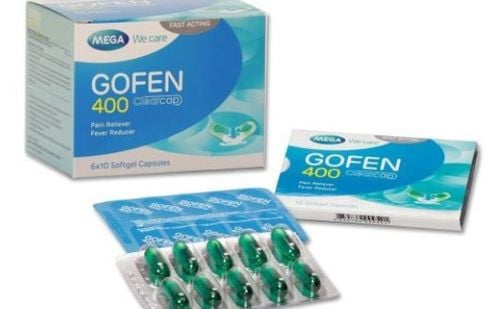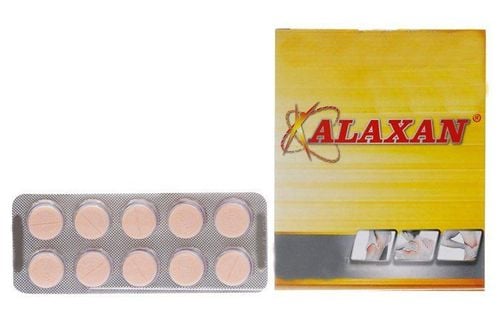The article was written by Pharmacist Nguyen Thu Giang - Pharmacy Department - Vinmec Times City International General Hospital.
Alaxan is a commonly used pain reliever and can be purchased easily without a prescription at pharmacies. However, this does not mean that the drug could be abused.
1. Ingredients of the drug
Alaxan is a drug containing 2 pain-relieving ingredients: 325mg paracetamol and 200mg ibuprofen in 1 tablet.
Paracetamol also known as Acetaminophen widely used in the treatment of mild to moderate pain. It is most effective in relieving low-intensity pain of non-visceral origin. Paracetamol has no antirheumatic effect.
In addition, Paracetamol is often used to reduce body temperature in patients with fever of any cause but does not reduce body temperature in normal people. Paracetamol is relatively safe at therapeutic doses.
However, paracetamol overdose is the main cause of acute liver failure. The risk of overdose is quite high as there are many pain relievers and fever reducers on the market that contain this ingredient, for example: Panadol, Efferalgan, Hapacol, Ameflu, Decolgen...
Additionally, this ingredient may cause some rare but serious, potentially fatal skin reactions such as Stevens-Johnson syndrome, toxic epidermal necrolysis (TEN), acute generalized exanthematous pustulosis (AGEP), Lyell's syndrome, patients need to stop taking paracetamol and see a doctor immediately if they see a rash or other skin manifestations or allergic reactions during treatment.

2. Precautions when using medicine
Patients with a history of such reactions should not take paracetamol preparations. Occasionally skin reactions including pruritic maculopapular rash and urticaria have occurred; other hypersensitivity reactions including laryngeal edema, angioedema, and anaphylactoid reactions may rarely occur. Paracetamol should be used with caution in patients with liver failure, renal failure, alcoholics, chronic malnutrition, or dehydration. Drinking a lot of alcohol can increase the liver toxicity of paracetamol, so avoid or limit alcohol consumption.
Ibuprofen is a non-steroidal anti-inflammatory drug, derived from propionic acid. Similar to other nonsteroidal anti-inflammatory drugs, ibuprofen has analgesic, antipyretic, and anti-inflammatory properties.
Ibuprofen should be used with caution in the elderly. Ibuprofen may increase liver enzymes, but these changes are transient and reversible. Ibuprofen inhibits platelet aggregation and may prolong bleeding time. Regular monitoring of liver function is required during long-term use of ibuprofen.
Plasma ALT concentration is the most sensitive indicator of the risk of liver dysfunction caused by nonsteroidal anti-inflammatory drugs. Patients with impaired renal function should be closely monitored when using ibuprofen. Ibuprofen may increase blood pressure or worsen hypertension, increasing the risk of cardiovascular events.
Ibuprofen increases the risk of serious cardiovascular events due to thrombosis. The risk of cardiovascular events with ibuprofen is increased in patients with cardiovascular disease or risk factors for cardiovascular disease. To minimize cardiovascular events, the lowest effective dose should be used for the shortest duration possible.
Patients should be informed about the symptoms of serious cardiovascular toxicity (chest pain, dyspnea, weakness, difficulty speaking) and instructed on what to do if these symptoms occur. Ibuprofen should be used with caution in patients with fluid retention or heart failure because side effects of fluid retention and edema have been reported with the use of these drugs.
Caution is advised because the antipyretic and anti-inflammatory effects of ibuprofen may mask the signs and symptoms of inflammation of other diseases. In particular, pregnant women in the third trimester should not take ibuprofen due to the risk of premature closure of the ductus arteriosus in the fetus.

3. Dosage of Alaxan according to manufacturer's recommendations
- Adults: Take 1 tablet every 6 hours as needed or as directed by a physician.
- Not for use by children under 12 years of age.
- Elderly people should use the lowest dose for the shortest possible time.
- Patients with impaired liver and kidney function: using low doses can minimize unwanted effects.
- Do not use for more than 10 days unless directed by a doctor.
To arrange an appointment, please call HOTLINE or make your reservation directly HERE. You may also download the MyVinmec app to schedule appointments faster and manage your reservations more conveniently.
Reference article source: Vietnam National Pharmacopoeia 2015, SPC
To arrange an appointment, please call HOTLINE or make your reservation directly HERE. You may also download the MyVinmec app to schedule appointments faster and manage your reservations more conveniently.









